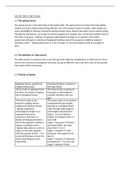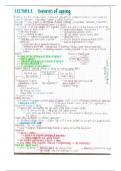Theories of ageing Study guides, Revision notes & Summaries
Looking for the best study guides, study notes and summaries about Theories of ageing? On this page you'll find 69 study documents about Theories of ageing.
All 69 results
Sort by
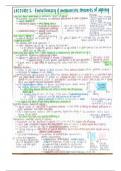 Popular
Popular
-
Lecture 2: Evolutionary and Mechanistic Theories
- Lecture notes • 2 pages • 2023
-
- £3.49
- 1x sold
- + learn more
Detailed notes explaining the dominating theories of ageing: evolutionary (mutation accumulation, antagonistic pleiotropy) and mechanistic (damage versus maintenance, hyperfunction).
Task 1A includes P1- Describe what is meant by the 'ageing process' and M1- compare and contrast theories of ageing
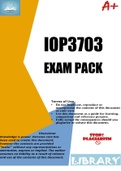
-
IOP3703 EXAM PACK 2023
- Exam (elaborations) • 111 pages • 2023
-
- £2.27
- 2x sold
- + learn more
IOP3703 Exam Memo Part 1 – The competent human being: The latest research shows the importance of developing employees on all levels of the organisation on a continual basis. Human Capacity Development – the focus is on developing behaviour, skills, attitudes and competencies that will enhance the overall quality of a person’s work life. Growth Psychology’s aim is to find and define a healthy personality. They argue that it is necessary for human beings to strive for that a...
Detailed lecture notes explaining the major theories and aims of studying ageing/senescence as a pathology from a scientific point of view.
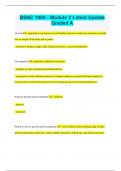
-
BSNC 1000 - Module 2 Latest Update Graded A
- Exam (elaborations) • 14 pages • 2023
- Available in package deal
-
- £8.08
- + learn more
BSNC 1000 - Module 2 Latest Update Graded A Growth - quantitative (an increase in cell number and size results in an increase in overall size or weight of the body and its parts) - indicators: height, weight, teeth, skeletal structures, sexual characteristics Development - qualitative (difficult to measure) - includes growth, maturation and differentiation - a progressive and continuous process of change leading to increased skill and capacity to function (the result of interactions between bio...
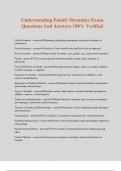
-
Understanding Family Dynamics Exam Questions And Answers 100% Verified
- Exam (elaborations) • 7 pages • 2024
-
- £9.29
- + learn more
Understanding Family Dynamics Exam Questions And Answers 100% Verified Critical Analysis - answerExamining underlying assumptions and power dynamics in information. Power Dynamics - answerAnalysis of who benefits most and least from an approach. Social Locations - answerIntersections of culture, class, gender, race, and sexual orientation. Family - answerTwo or more persons bound by mutual consent, birth, adoption, or placement. Census Definition of Family - answerIncludes married couple...
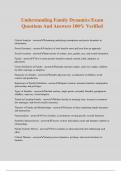
-
Understanding Family Dynamics Exam Questions And Answers 100% Verified
- Exam (elaborations) • 7 pages • 2024
-
- £9.29
- + learn more
Understanding Family Dynamics Exam Questions And Answers 100% Verified Critical Analysis - answerExamining underlying assumptions and power dynamics in information. Power Dynamics - answerAnalysis of who benefits most and least from an approach. Social Locations - answerIntersections of culture, class, gender, race, and sexual orientation. Family - answerTwo or more persons bound by mutual consent, birth, adoption, or placement. Census Definition of Family - answerIncludes married couple...
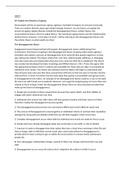
-
Unit 4-p4 Explain two theories of ageing
- Essay • 3 pages • 2023
- Available in package deal
-
- £2.99
- + learn more
P4- Explain two theories of ageing
![AQA A-LEVEL SOCIOLOGY 7192/2 Paper 2 Topics in Sociology Version: 1.0 Final IB/M/Jun23/E5 7192/2 Friday 9 June 2023QUESTION PAPER & MARKING SCHEME/ [MERGED] Mark scheme June 2023](/docpics/4383387/65ba57918772d_4383387_121_171.jpeg)
-
AQA A-LEVEL SOCIOLOGY 7192/2 Paper 2 Topics in Sociology Version: 1.0 Final IB/M/Jun23/E5 7192/2 Friday 9 June 2023QUESTION PAPER & MARKING SCHEME/ [MERGED] Mark scheme June 2023
- Exam (elaborations) • 61 pages • 2024
- Available in package deal
-
- £6.46
- + learn more
AQA A-LEVEL SOCIOLOGY 7192/2 Paper 2 Topics in Sociology Version: 1.0 Final IB/M/Jun23/E5 7192/2 Friday 9 June 2023 Morning Time allowed: 2 hours Materials For this paper you must have: • an AQA 16-page answer book. Instructions • Use black ink or black ball-point pen. • Write the information required on the front of your answer book. The Paper Reference is 7192/2. • Answer all questions from one topic in Section A and all questions from one topic in Section B. • Do all ...

-
PYC 2603Assignment Answers for Semester 1 2020.
- Exam (elaborations) • 10 pages • 2023
-
- £2.02
- + learn more
PYC2603 Assignment Answers for Semester 1 2020.Question 01 (Answer is 1) Reasons for dividing adulthood into substages include: (a) Adulthood may stretch over a period of 50 years or longer. (b) It is difficult to accurately define the stage of adulthood. (c) There is a gradual ageing of the world population. (d) Adulthood brings along continued changes in all areas of development. The correct answer is: (1) (a) & (d) (2) (a), (b) & (d) (3) (b), (c) & (d) (4) All of the above Question...

How much did you already spend on Stuvia? Imagine there are plenty more of you out there paying for study notes, but this time YOU are the seller. Ka-ching! Discover all about earning on Stuvia

